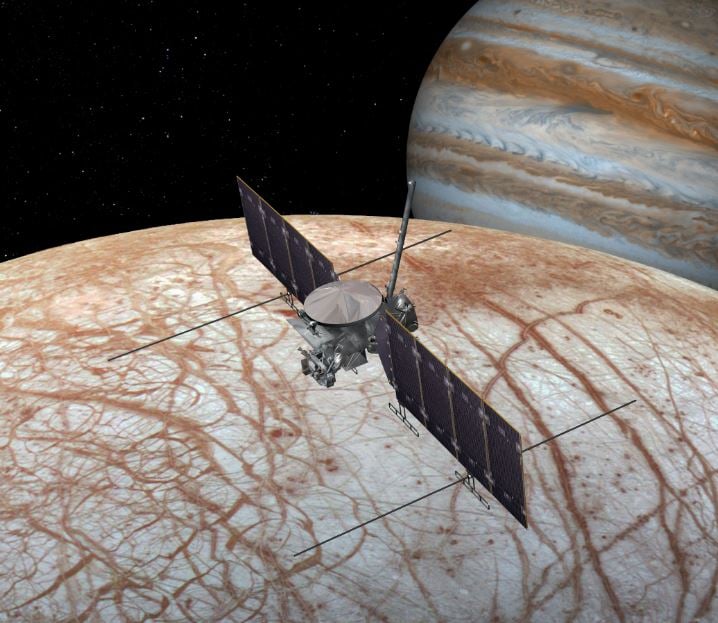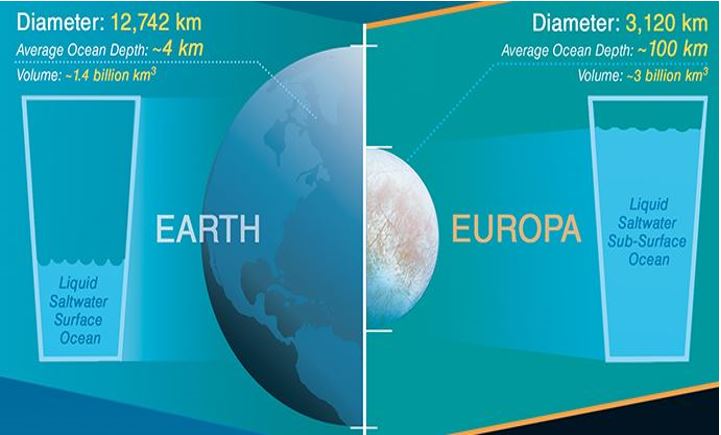When NASA said that Europa has something exciting in it and that it would explain what it was on Monday, the world of UFO hunters and alien enthusiasts missed a heartbeat with excitement. Of all the planets in our solar system, apart from Earth, this moon that orbits Jupiter is mentioned as the most likely to be host for life as we know it.
Europa, discovered in 1610 by Galileo Galilei, is one of Jupiter’s many moons – the smallest of its four Galilean satellites. It is slightly smaller than our moon, has lots of water, and an oxygen-rich atmosphere. Scientists have speculated that if there were life there, it would probably exist in its under-ice ocean, maybe in an environment similar to the deep-ocean hydrothermal vents here on Earth.
So, understandably when NASA said it had some amazing news to report on Europa, there was general excitement globally. Social networking websites went abuzz with rumours and speculation regarding NASA’s finding.
 NASA’s tweet made it evidently clear that no alien life forms have been discovered on Europa, much to the disappointment of millions of people across the globe. (Image: twitter.com/NASA)
NASA’s tweet made it evidently clear that no alien life forms have been discovered on Europa, much to the disappointment of millions of people across the globe. (Image: twitter.com/NASA)
Aliens in Europa moment was not to be
Thousands of people across the world were convinced this was it, this was the moment we had all been waiting for – the authorities would finally confirm that there is life out there and they had found it.
Sadly, this was not to be. Yesterday NASA poured ice-cold, salty water on that notion, stating emphatically that Monday’s announcement has absolutely nothing to do with aliens.
So, what could be such exciting news that NASA felt it necessary to warn us in advance of its announcement? NASA said that the Hubble Space Telescope had ‘found surprising evidence of activity’ on Europa. If it is not ultra-intelligent life, microbes, or any life forms, perhaps it has found evidence of geological or atmospheric activity – maybe water vapour plumes..
To make sure even the keenest of alien enthusiasts got their message clearly, NASA posted a tweet of its own: “Monday, we’ll announce new findings on Jupiter’s moon Europa. Spoiler Alert: NOT aliens.”
 NASA says it is planning for a future Europa mission that will conduct detailed reconnaissance of Jupiter’s moon and investigate whether it might harbour conditions suitable for life. NASA wants to send a spacecraft to Europa, orbit Jupiter’s moon, and study it carefully. (Image: jpl.nasa.gov)
NASA says it is planning for a future Europa mission that will conduct detailed reconnaissance of Jupiter’s moon and investigate whether it might harbour conditions suitable for life. NASA wants to send a spacecraft to Europa, orbit Jupiter’s moon, and study it carefully. (Image: jpl.nasa.gov)
Water vapour plumes on Europa?
In 2012, Hubble detected water vapour plumes high above the moon. They were only seen that once, and never again.
If there is evidence to link the plumes to Europa’s sub-surface ocean, it would make it much easier to investigate the habitable potential of the moon. Rather than having to drill through its thick, ice shell, researchers would be able to analyse the chemical content of the plumes.
Europa is full of water – the 3,100 km (1,900 mile) wide moon holds two to three times as much water as all the oceans on Earth. Scientists believe its oceans are salty, and warmed by powerful tidal forces generated by Jupiter’s gravity. This means that much of the oceans remain unfrozen.
NASA Teleconference on Europa
NASA issued the following statement three days ago:
“Astronomers will present results from a unique Europa observing campaign that resulted in surprising evidence of activity that may be related to the presence of a subsurface ocean on Europa.”
“Participants in the teleconference will be: Paul Hertz, director of the Astrophysics Division at NASA Headquarters in Washington; William Sparks, astronomer with the Space Telescope Science Institute in Baltimore; Britney Schmidt, assistant professor at the School of Earth and Atmospheric Sciences at Georgia Institute of Technology in Atlanta; Jennifer Wiseman, senior Hubble project scientist at NASA’s Goddard Space Flight Center in Greenbelt, Maryland.”
 There is more water on Europa than on Earth. Much of its water is in liquid form. Its atmosphere is oxygen rich. If anywhere in our solar system has life – apart from Earth – it is probably on this moon, scientists say.
There is more water on Europa than on Earth. Much of its water is in liquid form. Its atmosphere is oxygen rich. If anywhere in our solar system has life – apart from Earth – it is probably on this moon, scientists say.
Members of the media who want to participate by phone should contact Dwayne Brown at 202-358-1726 or [email protected] and provide their media affiliation no later than midday on Monday.
There will be a live stream of the audio of the teleconference at: http://www.nasa.gov/live
Video – NASA’s Mission to Europa
We know that on Earth, everywhere where there is water there is life. Could a liquid water ocean beneath Europa’s surface have the ingredients to support life? This NASA video talks about its mission to Europa.
